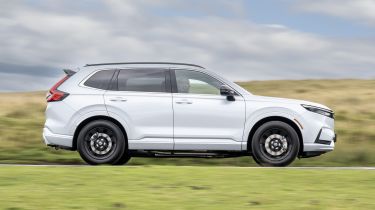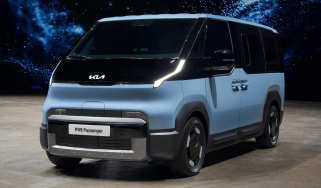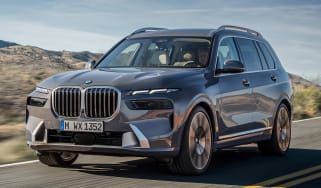Honda CR-V - Engines, performance and drive
Smooth, but not particularly swift. The Honda CR-V could also do with some refinement improvements

You might argue that power and fun aren’t relevant qualities for an SUV like the Honda CR-V, but rivals like the BMW X3 or Ford Kuga offer a more engaging drive. We were disappointed that the same nose-heavy feeling we experienced in the smaller ZR-V goes a step further here, with the limit of grip from the front being lower than we’d like in a large SUV. It’s especially at odds with the heavier-than-expected steering, which, in typical fashion these days, doesn’t offer much feedback as to when the CR-V starts to lose purchase on the Tarmac.
It’s best to drive it in a relaxed manner, which the CR-V is happy to do. Ride comfort is reasonable, and the CR-V doesn’t feel unwieldy on the road despite the increased size. Body lean in the bends is well-managed, but on the whole, there are sharper-handling SUVs out there. Matters aren’t improved in any of the four (or five in the e:PHEV version) drive modes you select: the only difference we noted was the augmented engine sound of a Honda Civic Type R being played through the speakers when ‘Sport’ mode was engaged.
Alterations can be felt with the CR-Vs regenerative braking system. You can increase or decrease how quickly the vehicle slows when you lift off the accelerator using paddles behind the steering wheel. The system isn’t strong enough for one-pedal driving, like you’ll find in a Nissan equipped with an e-Pedal system, but you’ll still get some satisfaction from using the regen’ to slow you down for a roundabout or help you filter in traffic without needing the brakes, plus it has the benefit of putting some energy back into the battery, helping to boost your fuel efficiency. The brakes themselves are strong, with a reassuring pedal feel.
Used - available now
Around town, the CR-V is supremely quiet when running in its electric mode. The e:HEV hybrid can only manage this for short periods due to its small battery, whereas the e:PHEV plug-in hybrid can travel farther without using the engine. It can also use its electric mode at higher speeds due to its greater battery capacity.
At motorway speeds, we found more road noise coming from the rear wheels than we’d like in a premium SUV, along with some wind noise. The engine can kick up a fuss when you’re in the midst of an overtake, and isn’t as subdued when stretched as a Renault Austral.
0-62mph acceleration and top speed
Both versions of the Honda CR-V use a similar 2.0-litre Atkinson cycle engine/electric motor combination used to power the current Civic e:HEV and ZR-V.
Driving the Honda e:HEV hybrid is straightforward, even if a lot happens behind the scenes. That 2.0-litre engine mostly works as a generator of electricity that powers the electric motors driving the wheels. The upshot is you get an electric car's smooth, jerk-free progress that makes the CR-V feel sprightly up to 20mph. Any electricity not being used to drive the CR-V charges a modest 1.06kWh battery, which stores enough power to allow you to drive for short distances at low speeds without using the engine.
At higher speeds, that battery will provide a power boost when you need to accelerate quickly, like when going for an overtake. It doesn’t have the hesitancy we’ve experienced in the Mazda CX-60 or Austral when asking for more power, but with only 181bhp on tap in a reasonably heavy SUV, the CR-V doesn’t feel particularly rapid. The 0-62mph for both the e:HEV hybrid and PHEV models is 9.4 seconds, which is best described as ‘adequate’ rather than thrilling. It’s marginally slower than a Kuga hybrid, and offers nowhere near the lightning performance of a genuine electric car, such as the Tesla Model Y.
At motorway speeds, the engine is connected to the wheels in a fixed gear ratio. Think of it like putting a regular petrol or diesel car into top gear, with the benefit of this being that unlike a Lexus NX and Toyota RAV4 with e-CVT systems that send the revs soaring when you need to accelerate, the Honda system doesn’t, and behaves much like a normal automatic gearbox.
The PHEV model has a larger 17.7kWh battery, which can power the CR-V for up to 51 miles on electricity alone. Once depleted, it behaves like the regular hybrid, without the dramatic drop-off in efficiency we’ve experienced in other plug-in hybrid SUVs.













